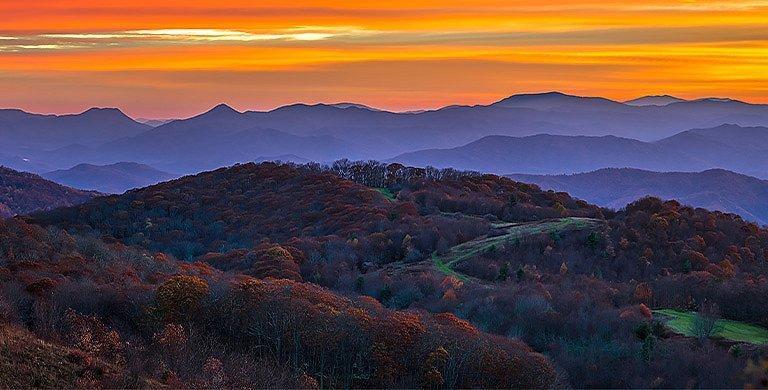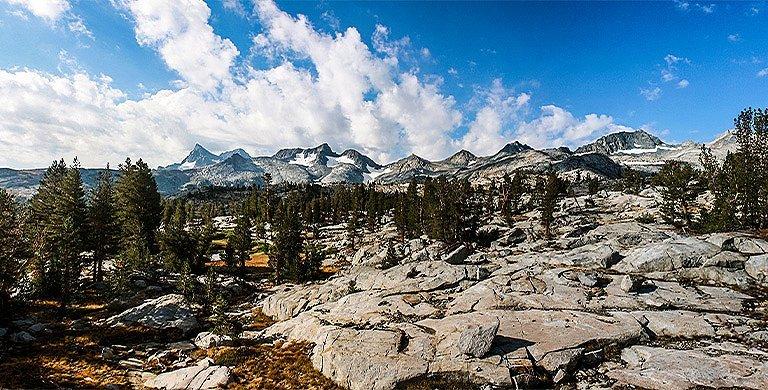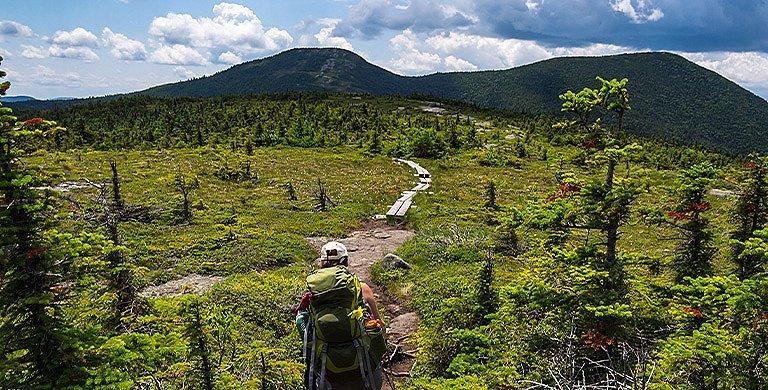HIKING
What is Trail Magic?
How random acts of kindness make a difference for thru hikers
BY NANCY BOUCHARD
Hiking is a privilege, but it can be hard work, especially if you are walking for months on end. Any day of the week, a random act of kindness can go a long way. But for people walking many weeks or months at a time on a thru hike, good deeds by strangers can make a real difference.
The term “trail magic” first emerged 1970s to describe spontaneous acts of kindness for thru hikers, though the concept has deeper roots in the hiking community. In 1948, Earl Shaffer completed the first recorded thru hike on the Appalachian Trail. In his book, Walking With Spring, Shaffer recounts meeting a stranger gave him a helping hand. When Shaffer inquired about repayment, the man “told him to pass the favor along to someone else.” Throughout his journey, Shaffer experienced kindness from strangers in the form of rides, meals, resupplies and lodging. The spirit of helping those in need has long been a hallmark of human generosity, and it continues to thrive in the hiking community today. Now, those who make “Trail Magic,” are affectionately known as “Trail Angels.” These people provide aid to weary travelers with no expectation of anything in return—only a request to pay it forward. Ultra-runner and Columbia Sportswear ambassador Yassine Diboun, owner and partner of Wy’east Wolfpack, emphasizes that “trail magic and trail angels are a real thing.” Having experienced both firsthand, Diboun is also a trail angel himself. “Trail angels are people who go out of their way, either through planning or spontaneity, to brighten a hiker’s day, often for a person they don’t know, or perhaps, will never meet,” he explains. “Their support can make a significant difference, from providing encouragement to helping hikers avoid hunger, thirst, heat and exhaustion.
The term “trail magic” first emerged 1970s to describe spontaneous acts of kindness for thru hikers, though the concept has deeper roots in the hiking community. In 1948, Earl Shaffer completed the first recorded thru hike on the Appalachian Trail. In his book, Walking With Spring, Shaffer recounts meeting a stranger gave him a helping hand. When Shaffer inquired about repayment, the man “told him to pass the favor along to someone else.” Throughout his journey, Shaffer experienced kindness from strangers in the form of rides, meals, resupplies and lodging. The spirit of helping those in need has long been a hallmark of human generosity, and it continues to thrive in the hiking community today. Now, those who make “Trail Magic,” are affectionately known as “Trail Angels.” These people provide aid to weary travelers with no expectation of anything in return—only a request to pay it forward. Ultra-runner and Columbia Sportswear ambassador Yassine Diboun, owner and partner of Wy’east Wolfpack, emphasizes that “trail magic and trail angels are a real thing.” Having experienced both firsthand, Diboun is also a trail angel himself. “Trail angels are people who go out of their way, either through planning or spontaneity, to brighten a hiker’s day, often for a person they don’t know, or perhaps, will never meet,” he explains. “Their support can make a significant difference, from providing encouragement to helping hikers avoid hunger, thirst, heat and exhaustion.
Diboun has racked up thousands of miles on trails in the US. During one season, while running the 450 miles of Oregon’s Pacific Coast Trail (PCT) section in a single push, he was surprised by the kindness of strangers. “Near Sisters, Oregon, I was running on the PCT in the heat of the day, questioning life choices, and incredibly fatigued,” says Diboun. “All of a sudden, I saw a big Igloo cooler, miles from any town. I wondered if it was a mirage or if I was hallucinating.”
To his astonishment, the cooler had a note on top that read “Help yourself, courtesy of Pac Man Pete.” Initially, Diboun thought that the offer was too good to be true, fearing that the cooler might be empty. “But it was full to rim of ice, and cans of beer and Dr Pepper,” he recalls. “That act of kindness meant so much to me. I really needed that inspiration. I took two sodas and put a bunch of ice under my hat. Pac Man Pete must have driven 20 miles down forest dirt roads just to reach that spot.”
While trail angels come from various backgrounds, many, like Diboun, are seasoned long-trail users who want to give back to the community. “The last time I drove by Mt. Shasta, I had a fridge full of La Croix in my camper van and offered them to hikers. They hadn’t had cold, bubbly water in hundreds of miles. It can be a game changer for someone and inevitably lifts their spirits,” he says. He’s also helped thru hikers on the PCT with what’s called “slack packing,” which means that in order for a hiker or hikers to move fast and light through difficult sections, someone will shuttle their heavy backpacks so they don’t have to carry them.
Diboun slows down when driving through sections where long trails like the PCT intersect main roads. If he sees thru hikers emerge from the backcountry, he offers them a ride into town. During the COVID pandemic, near Government Camp, Oregon, he stopped to pick up a thru hiker in his late 60’s. “I gave him a ride to town, and we had breakfast at the Huckleberry Inn. I learned about his life and it was fascinating. The guy worked, saved money and took leaves of absences to do thru hikes. Not only had the man completed Triple Crown--which includes the the Pacific Crest Trail, the Appalachian Trail, and the Continental Divide Trail--but had done each of them three times! When you open yourself up to helping people, you learn so much about their experiences and the lessons they’ve learned along the way. Going a little out of your way can really help a person out, and its rewarding for the trail angel as well.”
William Emerson, the 20th person to complete the Triple Crown of U.S. long trails, has encountered many forms of trail magic, but perhaps the most memorable involves food and drink. “Nothing perks up a hungry thru-hiker who is several weeks into a route like unexpected fresh food that they didn’t have to pack and carry,” says Emerson. One memorable occasion occurred after he spent two nights under a tarp during an unexpected snowstorm on the PCT near Chinook Pass, WA. After reaching the Mike Ulrich Cabin and warming up, he was greeted with a delicious meal and cold drinks. “Hiker hunger is real, and trail magic answers the call,” he adds.
There are many ways to supply trail magic. Numerous clubs work along the Appalachian Trail, the Pacific Crest Trail and the Continental Divide Trail. They provide volunteer opportunities that benefit thru hikers and day hikers alike. These projects can be short or long-term and focus on improving trail accessibility by removing fallen trees, repairing stonework, cutting back brush and ensuring that trail markers are in place. There are also Trail Day Celebrations you can sign up for along all three Triple Crown trails.
Diboun slows down when driving through sections where long trails like the PCT intersect main roads. If he sees thru hikers emerge from the backcountry, he offers them a ride into town. During the COVID pandemic, near Government Camp, Oregon, he stopped to pick up a thru hiker in his late 60’s. “I gave him a ride to town, and we had breakfast at the Huckleberry Inn. I learned about his life and it was fascinating. The guy worked, saved money and took leaves of absences to do thru hikes. Not only had the man completed Triple Crown--which includes the the Pacific Crest Trail, the Appalachian Trail, and the Continental Divide Trail--but had done each of them three times! When you open yourself up to helping people, you learn so much about their experiences and the lessons they’ve learned along the way. Going a little out of your way can really help a person out, and its rewarding for the trail angel as well.”
William Emerson, the 20th person to complete the Triple Crown of U.S. long trails, has encountered many forms of trail magic, but perhaps the most memorable involves food and drink. “Nothing perks up a hungry thru-hiker who is several weeks into a route like unexpected fresh food that they didn’t have to pack and carry,” says Emerson. One memorable occasion occurred after he spent two nights under a tarp during an unexpected snowstorm on the PCT near Chinook Pass, WA. After reaching the Mike Ulrich Cabin and warming up, he was greeted with a delicious meal and cold drinks. “Hiker hunger is real, and trail magic answers the call,” he adds.
There are many ways to supply trail magic. Numerous clubs work along the Appalachian Trail, the Pacific Crest Trail and the Continental Divide Trail. They provide volunteer opportunities that benefit thru hikers and day hikers alike. These projects can be short or long-term and focus on improving trail accessibility by removing fallen trees, repairing stonework, cutting back brush and ensuring that trail markers are in place. There are also Trail Day Celebrations you can sign up for along all three Triple Crown trails.
If you want to venture out on your own as a trail angel, there are many ways to show kindness. Consider hiking a shorter portion of the trail while carrying extra food, water, and supplies. This way, you can offer your extras to thru hikers you meet along the way. A cold bottle of water, a sports drink, a granola bar, a sandwich, or some fresh fruit can significantly boost a thru hiker’s spirits.
You can also follow Diboun’s example by helping transport thru hikers to trail towns or back to the trail. There are websites and social media groups that connect hikers with host homes in trail towns, providing shelter, laundry, and food assistance. The Appalachian Trail Conservancy offers an excellent list of trail magic guidelines, including tips for cleaning up if you host a trail-side aid station, as well as safety considerations for picking up hitchhikers.
You can also follow Diboun’s example by helping transport thru hikers to trail towns or back to the trail. There are websites and social media groups that connect hikers with host homes in trail towns, providing shelter, laundry, and food assistance. The Appalachian Trail Conservancy offers an excellent list of trail magic guidelines, including tips for cleaning up if you host a trail-side aid station, as well as safety considerations for picking up hitchhikers.
Whether you are hiking, thru hiking or providing some trail magic, Columbia Sportswear has the hiking gear you need.



